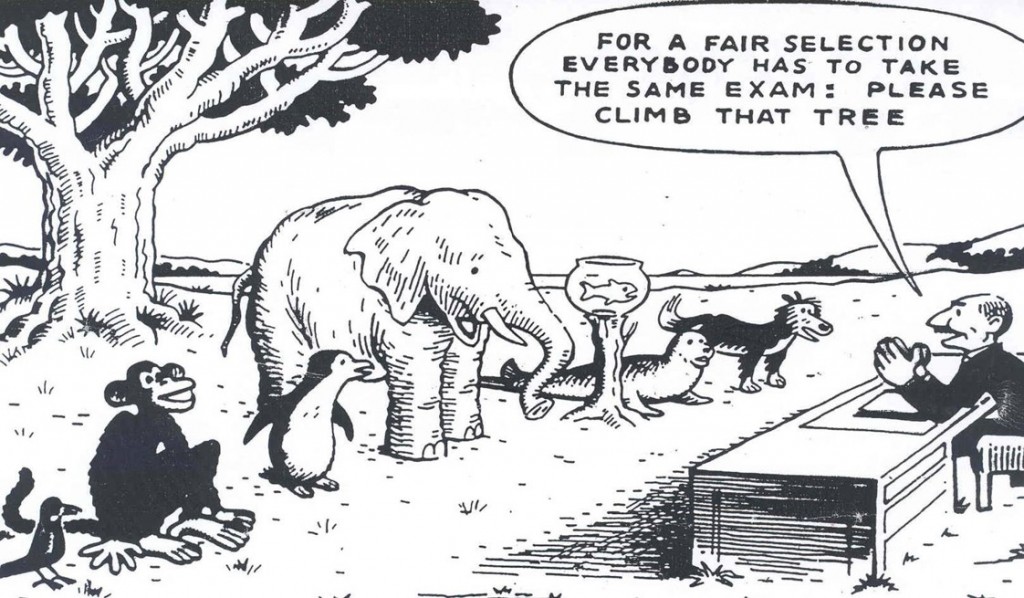Every time education moves progressively, it takes a few minute steps in regression. With regards to assessment, curriculum leaders and educational theorists have created a dichotomous state of grading these days. Our thought leaders have broken down assessment (read grading) into two categories: formative and summative. Of course, as in all things in education, new terms cloak old habits. So teachers have these fancy new “tools” to better understand students while little in the trenches of our classrooms has changed. Teachers are told to combine their evaluations by blending “formative” skills demonstrated and “summative” knowledges shown. We are given the new car, but not told how to use it. Of course, school being school, “summative” assessment, or in layman’s terms, tests, assignments, projects, or anything that warrants a “final grade” takes precedent. Educators are barraged with discourse pertaining to understanding the difference between the two, and the ones who actually pay attention get it. But even those that understand the schism are left with that – just a theoretical understanding of the difference between formative and summative evaluation. Teachers are not taken to the next step and told how to do both well. In any case, teachers must be taught keys to determine how to assess students well. Below are 5 keys that can guide teachers when assessing students.
To do assessment well, you must:
Know your students first
The children you are responsible for nurturing come first. When assessing children, you must understand, firstly, your students. You must learn their work habits, their styles, their engagement – them personally. Without understanding your students and what drives them to answer questions and write what they do on a paper, you will be lost, and your formative assessments will serve as mute reference points.
Understand that all assessment is fundamentally subjective
Unless we are talking about black and white answers in math and maybe science, all answers by students are personally judged. Some teachers use formative assessments to boost students’ “grades” on the presumption that the summative examples they dole out will be the ultimate arrival point of objective knowledge. But all knowledge, realistically speaking is subjective. So we must understand that when we assess we are using our subjective biases, for better or worse, to judge children. Counterintuitevely, keeping this in mind will lead to a more “objective” stance in understanding the various unique knowledges that our students possess.
Assess formatively in ways that are not always “formative”
Formative assessment is not confined to the barriers of nonchalant observations. Tests can be formative. Assignments can be formative. Formative assessment derives from an understanding that knowledge is split into two terms – a priori knowledge, and posteriori knowledge, both still underpinning the fundamental assumption that the human is always capable of learning more. If you want to test, that is fine, but understand that your students often learn at different paces so be prepared to scaffold your classroom learning to accommodate for varying deadlines and overall objectives.
Reject your savior role and understand that your students sometimes garner other needs
All types of assessment instill a sense in teachers that they are the be all and end all of their classroom. This is true to a certain extent. But grading and assessment must take into consideration the effect they have on a child. We may feel like Old Testament God in the classroom, but we are not. Some students need more nurturing, more positive encouragement, and a host of other needs that are not solely derived from a grade or a teacher student conversation. Be flexible in your role as a teacher and understand your importance without getting caught up in it.
Grades are not the be all and end all of education
When you mark an English paper and give a paragraphs worth of personal commentary on the back page, what is the first and only thing students do. They look at the grade only! I am close to being an advocate for a grade-less educational system at the elementary level because I know that power that a single letter or percentage has on the psyche of a young mind. But teachers weild this power. And they often use it with the understanding of the implicit and explicit damage (or reward) that it can do to a child. Stepping away and instilling a notion of creation, innovation and personal growth that is not necessarily attached to a final grade is a move that education desperately needs. It will take a lot to finally move there, but when teachers create a classroom community that is dependent on a heirachical order based on grades, it perpetuates the dysfunctional aspects of the society we live in today. Grades are important, but they are not the ultimate marker of a child. Teachers should constantly relay this message to students when handing back work that has been assessed. Personal growth is the key, not a grade.
When using assessment, keep these keys in mind. There are many other watch-fors when assessing, but with these 5, you will ensure that you are as “objective” as possible and putting your students first.
[share title=”Share this Post” facebook=”true” twitter=”true” google_plus=”true”]

